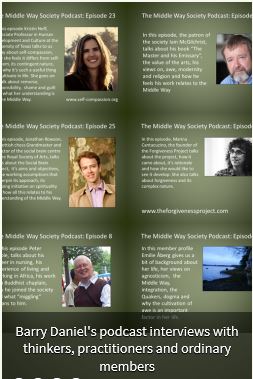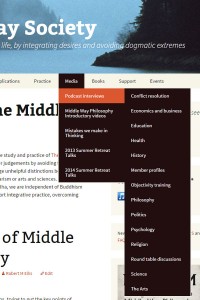With the recent podcast interview with Karen Armstrong, Barry Daniel (with occasional assistance from Susan Averbach) has now completed one hundred podcasts. Congratulations Barry! To mark my appreciation of this significant achievement, I want to celebrate the podcasts in general and pick out a few highlights.
When the society was first founded, in 2013, Barry quite early on had the idea of doing podcast interviews to stimulate discussion in and around the Middle Way. Podcasts were then, and remain, a popular format for communication and exploration of ideas on the web. Of course there were lots of popular podcasts that we could emulate, but perhaps one substantial prior influence that should be acknowledged is Ted Meissner with his Secular Buddhist podcasts (even though the MWS podcasts are also very different from Ted’s!).
We also had ideas about the role the podcasts would play in the society, and what would make them distinctively different from other podcasts. The Middle Way and Middle Way Philosophy is unusual in being rarely discussed in explicit terms, but nevertheless being widely appreciated implicitly, and having many overlapping areas of interest. So the main task of the podcasts is not so much to expound the Middle Way explicitly, as to explore some of the huge range of related ideas and practices as they are found in the live experiences of people. In that way we hope to touch on the interests of a wide variety of people, and stimulate discussion of the Middle Way from a variety of perspectives.
In many ways Barry was exactly the right person for that job. It primarily needed someone who was good at engaging with people and listening, which are amongst Barry’s prime skills in my experience. Of course, it also required a lot of hard work: contacting people to set up the podcasts, doing the interviews, sound-editing them, creating a visual version for YouTube and publishing them online. I know that Barry also does a lot of careful preparation in other respects – for example, often reading the book of an author before he interviews them about it, and consulting about the best questions to ask. So the podcast also requires someone with wide interests and curiosity about a range of subjects: again, Barry’s your man.
Nearly three years on, then, what do I think the podcasts have achieved? Well, there are a wide range of people from a range of backgrounds and disciplines who have all communicated something helpful and inspiring to the podcast audience. All these people have also been asked that ultimate or penultimate question: “What is your understanding of the Middle Way, and how might it relate to what we’ve been talking about?” and in the process of answering it, the interviewees have engaged with the core ideals of the society. Some knew nothing explicit about the Middle Way, whilst others had well-developed ideas about it, but all have made new connections. Some interviewees have stayed in touch, become personal friends, and even joined the society. A few, of course, were already members before they were interviewed. The podcasts have thus created a wide range of connections, both intellectual and social.
The answers to that question about the Middle Way have varied enormously in style and approach, but there are very few, if any, with which I would disagree as characterisations of the Middle Way – all of which goes to show the huge variety of ways it could potentially be approached and understood, without losing a basic similarity. That similarity comes from our shared experience as human beings of what sorts of attitudes are progressive, helpful or integrative, and how these contrast with dogmatic positions whether positive or negative. To get a taste of the variety of answers to that question, have a listen to episodes 29 and 30, where Barry collected together the first batch of answers he received.
Any selection I could offer you of the best podcasts is inevitably going to reflect my own tastes, and the easiest way of selecting them according to your own is to look at the podcast list page or any of the thematic pages that spring from it on the menu above (see picture). But here are some of the ones that I personally think are most important or interesting.
In Episode 6, Barry interviewed Iain McGilchrist, the author of ‘The Master and his Emissary’, the wide-ranging and important book on brain lateralisation and its effects on human thought and culture. Iain is the patron of the society, and his work has many connections with the Middle Way, as we can understand the Middle Way as avoiding the absolutisations created by the over-dominant left hemisphere of the brain. This link between the Middle Way and the brain was also explored further in the dialogue I had with Iain in episode 33.
Episode 32 with Ed Catmull is another early highlight. Ed Catmull is the President of Pixar and Disney Animation and a life member of the society. His connection with the Middle Way comes from his own experience of developing a business that fosters creativity: creativity that can only be found in the ‘messy middle’ that Ed talks about.
Episode 39 with Stephen Hayes is by far the most popular podcast, having over 16,000 views on YouTube. This is an in-depth exploration of Acceptance and Commitment Therapy, illustrating just one of the very many links that can be made between the Middle Way and psychotherapy. Barry has also interviewed some important academic psychologists whose ideas bear a close relationship to the Middle Way, such as Ellen Langer and Elliott Aronson; as well as neuroscientists, philosophers, social scientists, environmental thinkers, politicians, and scholars of religion.
But if that gives you the impression that the podcasts are rather academic in flavour, it’s important to stress that they’re also often about telling personal stories or discussing practices. Some of the most moving podcasts in the series are with Arno Michaelis, a former racist skinhead, and Bjorn Ihler, survivor of a massacre on a Norwegian island. Both of these have inspiring stories to tell about an integrative journey that involved moving away from the absolute positions associated with hatred. Then to my mind one of the best podcasts about practice is the one with Elizabeth English, teacher of focusing. But there are also discussions of (for example) Tai Chi, biofeedback, sleep, ethics, politics, and building community.
That doesn’t exhaust the riches of the podcasts at all. I haven’t even dropped all the famous names Barry has interviewed. But I’ll limit myself to a small and personal selection here. There’s one final one I must mention. In episode 69, Barry himself was interviewed by Susan Averbach. So, if you want to find out more about the interviewer, that’s the place to go! I’ll embed that video at the foot of this blog.
What about the future of the podcasts? Well, Barry still seems to be going strong, but I know that he would very much appreciate some help. Susan Averbach has helped out by doing a few interviews, which has been a good way of varying the voice and style of the podcasts, and there could be scope for more people to get involved in interviewing. However, it’s at the time -consuming ‘back end’, i.e. the editing, that I’m sure Barry would most appreciate offers of help. In addition, if you have ideas of future people for Barry to interview, or you want to be interviewed yourself, just get in touch with Barry (at middlewaysociety.org). If the podcasts have weaknesses, these will also be best raised and addressed by new people with new perspectives getting involved. If it becomes more of a shared venture and less dependent on one individual, I’m sure the podcasts can continue to engage new people in thinking afresh about the Middle Way in the long term.
